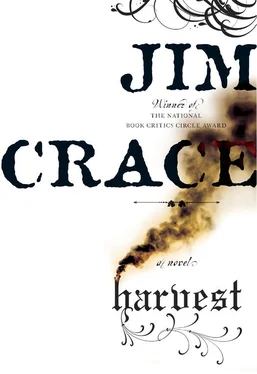As I imagine it, the men will have held Lizzie Carr by her irresistible plaits — like her uncles will have done a thousand times before, like I have done myself. They would have been more playful than spiteful, at first, and meant only to prevent her skipping off. Why was she in the lane at all, they’d want to know. Hadn’t she been instructed quite clearly by Master Jordan that nobody must stray today beyond the barn? And, more to the point, how was it that a common little girl like her was sporting such a fine and pretty dressing on her head? When she told the truth, that Master Kent had given it to her, and that she was the Queen for one whole year, they were bound to doubt her word, tighten their great hands round her willow arm, and march her off to answer more practiced and judicial questions in Master Jordan’s presence.
What is not yet clear — at least not clear to me because it seems that, for the moment, I am not included in the village circles — is how the two women became involved. Anne Rogers is the fiery sort, I know. It’s never wise to disagree with her, even if you’re family. And Kitty Gosse is mulish when she wants to be. If they were working at the entry of the barn, in plain sight of the lane, and witnessed Lizzie being taken off by those three coarse and stony men, who only this morning were party to the prophecy that we should expect to see a neighbor hanging from an oak by sundown—“God bless you all, and God help one of you,” he’d said — I can’t imagine them standing aside. I can imagine, though, a tug of war between the women and the men, with this year’s Gleaning Queen the scrap of flesh they were fighting for. The women wouldn’t have stood a chance. They’d have been outnumbered, for a start; outmuscled too. But it might have taken some kicking and some bruising before they admitted defeat and allowed themselves to be dragged away like sows to face the consequences of their meddling.
No doubt the sound of Anne Rogers’s battling voice reached the barn. Everybody would have hurried out, glad of the excuse to put down tools and see the last tugs of the struggle in the lane. Those clod-heads in their matching uniforms who were so churlish and so dangerously bored earlier in the day were now setting upon two village women and a child and dragging them off to who-knows-where and with who-knows-what in mind. Of course, the threshing and the winnowing came to an early end at once. This would have been the moment, I am sure, when Brooker and the twins, our arsonists, judged it best to pack and go before their secrets were uncovered. They wouldn’t want to decorate that sundown oak.
I know my neighbors well enough to share their anger and alarm — though it seems they’re still not so keen to have me in their company and sharing anything this evening. They reply to any simple question I might put with, Why are you asking that? and, Who needs to know? They’re closing ranks already and I am not included, despite my dozen years of standing at their shoulders. Old friends avoid my eyes. They duck away from me. Even John Carr is reluctant to talk. He hardly offers me a phrase. My once darker hair is clashing with their blond again. It is their reminder that I am the master’s man before I am a villager, that I have spent my afternoon with Mr. Quill, preparing for the coming of the sheep, and not with them, helping with the wintering of grain. I did not join them when they faced drawn arrows at the newcomers’ den. I did not join the dancing in the barn. I did not even join the gleaning of the barley field, and that was inexplicable. They know that when their cottages were so roughly pulled apart this morning, I was there to witness it but not to stop it. The knowledge that I spent last evening naked in the widow’s bed will not have come as a surprise, but then it will not have done me any favors either. The half of the village most related to Kitty and Fowler Gosse will see me as a poacher; and the other half are Saxtons or Saxton kin and will count me as a traitor to my — and their — sweet Cecily. The envious men will be the most outraged. Many of my neighbors nurtured a seedling for Kitty Gosse and will resent my success. Maybe even one or two of their wives might once have nurtured shoots for me. I must have represented all the world for them when I arrived, and then when I became a widower … well, I had sweet-natured offers, let me say, but stepped away from all but one of them. So I cannot condemn my neighbors for closing ranks. These are nervous, jealous times for all of them.
And I know their expressions well enough, even in this evening gloom, to understand that these are also dangerous times for me. If there are offerings to be made, if there’s a name that should be whispered loud enough for this new master to overhear, a name that might conveniently connect a suspect with a crime or might divert suspicion from a native-born, better it is mine than any of their men’s, better I’m dragged off to sleep with Willowjack than anybody else. Unlike the twins and Brooker Higgs, already lost to us, it seems, I never was a local tree, grown in this soil from seed, to die where I was planted. I can be done without, and with no lasting harm. I’m no great sacrifice.
I do not blame them, honestly. I’m not a person they should trust, not at the moment anyway. I’ve not been loyal of late, or even tried to cling on to their love. I have kept too many secrets and too many confidences to myself. I have not told them what I overheard in the manor house gallery or what Mr. Quill has divulged to me about the older Edmund Jordan’s will and its entitlements. I plead guilty to the charge of being too tight-lipped, though I might say my silence was judicious rather than dishonest: I cannot serve each master and each friend with equal shares. I do not even know myself who it is I want to please, besides myself, or where I most want finally to rest my head. In Mr. Quill’s employ, I think, although there’s something in his colored charts, his hawk-high version of the world, that makes me wonder if he is too skittish and too vulnerable for me with his never-fading smile, his wooden lurch. He said as much himself this afternoon: “I am the roughest piece of furniture.” You won’t be comfortable with me, in other words. I am reminded of that country saw, Only a fool would strap a saddle to a wooden bench and hope to ride it home.
Perhaps, now that I am fallowed by the cottagers, I ought to speak my piece to Master Kent, persuade him to reemploy me as his man. He might let me move back to the manor house. I’ll take the attic rooms again. He’ll need an ally when his cousin claims command, however distantly, and when the sheep invade his fields. He is my only brother in a way, though I cannot think he is my family. But whatever future I can devise for myself, I cannot be lighthearted about the present. I am furrowed sad tonight to see the village back away from me. My neighbors leave me standing on my own. Now I wonder if I’ve been a fool about this place; my restlessness is just a curse, a moling demon in my heart whose mischief is to have me leave the only acres that can provide me happiness. But then I understand too well, from what I’ve heard and seen, that any happiness — or at least the lands that nurture it — will not survive the autumn frosts.
So I stay a little to the side, forgotten or at least ignored in the shadows, and do not add my voice to theirs as they discuss what should be done about their disappearing sons, the pair of women who are held, and little Lizzie Carr. We’re the majority, they protest. We must be listened to. I hear the word petition . I could tell them, had they not decided to be deaf to me, that numbers amount to nothing in such matters. Dissent is never counted; it is weighed. The master always weighs the most. Besides, they can’t draw up a petition and fix it to the doorway of the church as other places do. It only takes a piece of paper and a nail, that’s true. But, even if they had a doorway to a church, none of them has a signature.
Читать дальше












